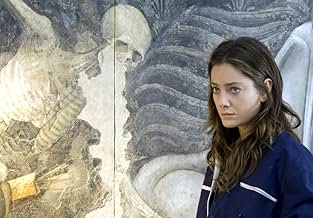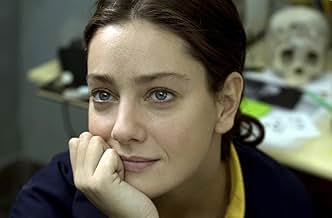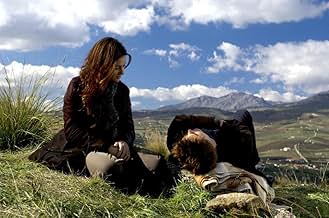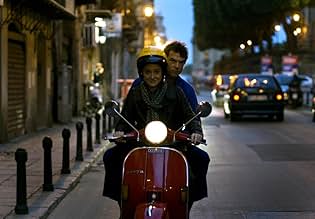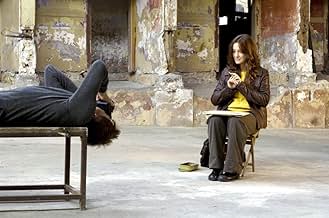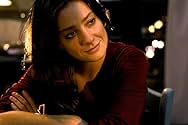Palermo Shooting
- 2008
- 2h 4min
VALUTAZIONE IMDb
6,1/10
3301
LA TUA VALUTAZIONE
Dopo che lo stile di vita selvaggio di un famoso giovane fotografo tedesco lo ha quasi fatto uccidere, va a Palermo, in Sicilia, per prendersi una pausa.Dopo che lo stile di vita selvaggio di un famoso giovane fotografo tedesco lo ha quasi fatto uccidere, va a Palermo, in Sicilia, per prendersi una pausa.Dopo che lo stile di vita selvaggio di un famoso giovane fotografo tedesco lo ha quasi fatto uccidere, va a Palermo, in Sicilia, per prendersi una pausa.
- Regia
- Sceneggiatura
- Star
- Premi
- 1 vittoria e 2 candidature totali
Recensioni in evidenza
Finn (Campino) is a German photographer. He is highly successful in his profession, but not in life. He can't quite put his finger on it, yet there's something missing and he is overwhelmed by dark thoughts. He decides to spend some time in Italy as an attempt to escape.
Palermo Shooting is a movie heavy on symbolism and with a clear philosophical orientation, a meditation about life and death. However, its good looks are its strongest asset. The setting is once again in the spotlight for Wim Wenders, first beautiful Palermo and then the gorgeous landscapes of a small Italian village.
The main character's interactions with Death are reminiscent of Bergman's The Seventh Seal, while his subjective way of experiencing reality and the use of special effects has a clear touch of German expressionism.
It's easy to tell this was a very personal project for Wim Wenders, but still not everything works. The philosophical aspect isn't that interesting or original, the dialogue leaves a lot to be desired, the soundtrack felt a bit off.
Palermo Shooting is a movie heavy on symbolism and with a clear philosophical orientation, a meditation about life and death. However, its good looks are its strongest asset. The setting is once again in the spotlight for Wim Wenders, first beautiful Palermo and then the gorgeous landscapes of a small Italian village.
The main character's interactions with Death are reminiscent of Bergman's The Seventh Seal, while his subjective way of experiencing reality and the use of special effects has a clear touch of German expressionism.
It's easy to tell this was a very personal project for Wim Wenders, but still not everything works. The philosophical aspect isn't that interesting or original, the dialogue leaves a lot to be desired, the soundtrack felt a bit off.
I just saw the movie in International Film Festival of Durrës, eager as I was for another Wim Wenders experience. And I left the theater with mixed feelings. Images were so good, bur the story was so cheap. The apology of Death at the end of the movie was awful, as if written by a 15 years scholar. So was the dialogue with the shepherd. Cheap and cliché ideas about death and life. The presence in the story of G. Mezzogiorno was senseless and not justified at all. The story of a photographer that takes a shoot of Death, is not bad, whatsoever. But it surely didn't to be treated as in child books, with death coming towards you and moralizing about life and death. And above all, the pregnant Milla, pretending deeper art in VIP Photo shooting, gave a sense of pity. No worth seeing it twice.
I saw it yesterday at a late evening screening in Los Angeles with Wenders in-attendance, and he did an intro and stayed for a Q&A afterward (which ended at 1:30am!)
I'd describe Palermo Shooting as an interesting failure, though with some good stuff in it. And not as a worst-ever film, or even as awful like some folks. Also interesting to me was how the naturalistic Wenders of "Paris, Texas" days has embraced modern CGI effects.
Dennis Hopper, in his last role, was very good in a small but important supporting part in the very last scene of the film (don't walk out early or quit watching, cause you'd miss Hopper).
It's kind of a 3 act play defining by its locations: Act 1. Dusseldorf, Act 2. Palermo, Act 3. Gangi.
Not one of Wenders good ones. But if it had some editing-out of some of the more pretentious musing stuff, and general tightening-up, and a bit of clarification here and there, it could've been pretty good. Too bad...
For a long and detailed plot summary, see the German Wikipedia page (worthwhile to do even putting up with Google Chrome's German-to-English translation.) It helped clarify a lot for me. de.wikipedia.org/wiki/Palermo_Shooting (Note: the English Wikipedia page was very minimal).
I'd describe Palermo Shooting as an interesting failure, though with some good stuff in it. And not as a worst-ever film, or even as awful like some folks. Also interesting to me was how the naturalistic Wenders of "Paris, Texas" days has embraced modern CGI effects.
Dennis Hopper, in his last role, was very good in a small but important supporting part in the very last scene of the film (don't walk out early or quit watching, cause you'd miss Hopper).
It's kind of a 3 act play defining by its locations: Act 1. Dusseldorf, Act 2. Palermo, Act 3. Gangi.
Not one of Wenders good ones. But if it had some editing-out of some of the more pretentious musing stuff, and general tightening-up, and a bit of clarification here and there, it could've been pretty good. Too bad...
For a long and detailed plot summary, see the German Wikipedia page (worthwhile to do even putting up with Google Chrome's German-to-English translation.) It helped clarify a lot for me. de.wikipedia.org/wiki/Palermo_Shooting (Note: the English Wikipedia page was very minimal).
image - still and moving - digital - film - panorama - window - painting. how is the world described in photographic/image capture? who sees? framing. who is seeing? what is seen? what is shown? dreams. i am a camera. this is maybe an over extension of the metaphor, but clearly states the idea of the seer seeing. audience. and the seer showing. story through experience, not always linear or real. and always - great views of the city. great mix of language & languages. vision. so much feeling, showing and not telling. faces, moments, real, unreal... "I watch it for a little while = I love to watch things on TV" this was interesting to see in las vegas, of all the places in the world.
Wenders' supreme quality as an author, to my view, is that he knows that his films are not so much about what images show, but about images themselves. This is his magic, and his curse. This is why i have a shelter in his films, and why so many increasingly misunderstand them (first reviews on this one show it will go to the same package). Wenders knows this, whenever he is making a film, he is reflecting on the nature of image, and how that affects vision, and how vision affects understanding, and how understanding affects meaning, and essence.
Not few times, he addresses directly the theme, and embeds it in the plot of the film. This is such a case. Film about images. People who are about image. People who become the images they fetch. The very first scene makes it clear. It "frames" (how meaningful this word is with Wenders) a landscape, through a window of a building which is in itself all about framing. A pure volume full of square holes, all of them corresponding to a different frame, depending on moment you look, position, distance to the window. This building reflects the personality of the photographer, it is in itself a succession of frames, a closed capsule interlaced with partial views to the outside.
Than we have a story about creating images. A character photographer who loses his soul because he becomes a faker, he forgets the essence, he no longer searches for a truth in the image, instead he creates his own fake truth. Fake Australian skies reflected on S.Paulo's windows, that kind of stuff. The introduction of Milla stands for this, as she is photographed 'artificially', and than transported to the "true" environment. Than the photographer retires, isolated, to a place he feels to be 'true' (a big port, Palermo means).
Now the big things happen in Palermo.
The woman. Her work is to recover images, it is to find the "truth" of images, it is to interpret the vision of somebody else. Those eyes of the painter, starring at the "camera", what he was seeing is what she wants to see. Check the oppositions, check how that fresco is worked on the film: detail versus global sight, understanding versus loosing the essence, long versus short. Check how the time of an image is understood. The woman takes years working on one image, the photographer produces thousands without understanding a single one.
The Death. It's not the death, it's Dennis Hopper, and this matters. To see how Hopper was inserted in this project made the whole thing come clear to me, and it completed a portion of my film life that i now know was incomplete. Hopper is here the designated master framer, the man who observes life, who pulls strings (even though he is only doing his job). He is a superior agent, someone who is beyond and above all that we see. When people look at him, he looks back. He makes the record of all that, we see that, that metaphor of arrows, of "shooting" with a double meaning. So he is framed as much as he is a framer. Now, remember The American Friend. See that film before seeing this one if you can, it may strike you as 2 halves of the same idea, as it stroke me. Check how similar are the characters Hopper performs. There he was also the master framer, the manipulator behind the actions that we had. In fact he was manipulating a "framer" (literaly, a man who created frames for paintings). He used the framer as he provided the main "image". That film, which i consider essential, was all about the same game of images. Now we have an update, on how times changed (and with it changed deeply our relation to images) and how Wenders himself changed. Dennis Hopper is the connection, and his role is pivotal.
Now, i believe that if you want to establish a successful relation to a creator you have to take his works for what they are. It's like loving beyond infatuation, like friendship beyond day to day chat. You have to enjoy the qualities and most important, acknowledge the flaws, and you have to live with that. That's my kind of relation with Wenders. His films in the last 10 years or so have become more and more on the verge of being an intellectual monologue, something you are supposed to sit and listen, and nod affirmatively with you head. That's something i won't tolerate with other filmmakers (Stone, Tarantino), but that i'm willing to put up with Wenders, because it matters to me what he has to say. If, like i did, you are able to put up with discursive dialogs, and the sensation that the man beyond the scenes is leading you to believe that he has the Truth, you may let this change your life. I did.
A side quality you might appreciate is how music shapes the environment, regardless of the scenery. Wenders was also great in understanding this, now he does it with the aid of portable music. The music editing is great
My opinion: 5/5
http://www.7eyes.wordpress.com
Not few times, he addresses directly the theme, and embeds it in the plot of the film. This is such a case. Film about images. People who are about image. People who become the images they fetch. The very first scene makes it clear. It "frames" (how meaningful this word is with Wenders) a landscape, through a window of a building which is in itself all about framing. A pure volume full of square holes, all of them corresponding to a different frame, depending on moment you look, position, distance to the window. This building reflects the personality of the photographer, it is in itself a succession of frames, a closed capsule interlaced with partial views to the outside.
Than we have a story about creating images. A character photographer who loses his soul because he becomes a faker, he forgets the essence, he no longer searches for a truth in the image, instead he creates his own fake truth. Fake Australian skies reflected on S.Paulo's windows, that kind of stuff. The introduction of Milla stands for this, as she is photographed 'artificially', and than transported to the "true" environment. Than the photographer retires, isolated, to a place he feels to be 'true' (a big port, Palermo means).
Now the big things happen in Palermo.
The woman. Her work is to recover images, it is to find the "truth" of images, it is to interpret the vision of somebody else. Those eyes of the painter, starring at the "camera", what he was seeing is what she wants to see. Check the oppositions, check how that fresco is worked on the film: detail versus global sight, understanding versus loosing the essence, long versus short. Check how the time of an image is understood. The woman takes years working on one image, the photographer produces thousands without understanding a single one.
The Death. It's not the death, it's Dennis Hopper, and this matters. To see how Hopper was inserted in this project made the whole thing come clear to me, and it completed a portion of my film life that i now know was incomplete. Hopper is here the designated master framer, the man who observes life, who pulls strings (even though he is only doing his job). He is a superior agent, someone who is beyond and above all that we see. When people look at him, he looks back. He makes the record of all that, we see that, that metaphor of arrows, of "shooting" with a double meaning. So he is framed as much as he is a framer. Now, remember The American Friend. See that film before seeing this one if you can, it may strike you as 2 halves of the same idea, as it stroke me. Check how similar are the characters Hopper performs. There he was also the master framer, the manipulator behind the actions that we had. In fact he was manipulating a "framer" (literaly, a man who created frames for paintings). He used the framer as he provided the main "image". That film, which i consider essential, was all about the same game of images. Now we have an update, on how times changed (and with it changed deeply our relation to images) and how Wenders himself changed. Dennis Hopper is the connection, and his role is pivotal.
Now, i believe that if you want to establish a successful relation to a creator you have to take his works for what they are. It's like loving beyond infatuation, like friendship beyond day to day chat. You have to enjoy the qualities and most important, acknowledge the flaws, and you have to live with that. That's my kind of relation with Wenders. His films in the last 10 years or so have become more and more on the verge of being an intellectual monologue, something you are supposed to sit and listen, and nod affirmatively with you head. That's something i won't tolerate with other filmmakers (Stone, Tarantino), but that i'm willing to put up with Wenders, because it matters to me what he has to say. If, like i did, you are able to put up with discursive dialogs, and the sensation that the man beyond the scenes is leading you to believe that he has the Truth, you may let this change your life. I did.
A side quality you might appreciate is how music shapes the environment, regardless of the scenery. Wenders was also great in understanding this, now he does it with the aid of portable music. The music editing is great
My opinion: 5/5
http://www.7eyes.wordpress.com
Lo sapevi?
- QuizThe film marks the first time that Director Wenders shot a movie in his hometown, Düsseldorf.
- BlooperIn the scene, when Finn talks with lady photographer, they discuss the age of their cameras. He tells that his Plaubel is twenty years old and she tells that her Leica is 40 years old. Actually she has Leica M7, which slightly differs from older Leica cameras. This camera marketed only in 2002.
- ConnessioniFeatured in Dennis Hopper: Uneasy Rider (2016)
- Colonne sonoreDream (Song for Finn)
Written by Nick Cave and Warren Ellis
Performed by Grinderman
Published by Mute Song Ltd. 2008
Courtesy of Cave/Ellis 2008
I più visti
Accedi per valutare e creare un elenco di titoli salvati per ottenere consigli personalizzati
- How long is Palermo Shooting?Powered by Alexa
Dettagli
- Data di uscita
- Paesi di origine
- Siti ufficiali
- Lingue
- Celebre anche come
- Palermo Story
- Luoghi delle riprese
- Aziende produttrici
- Vedi altri crediti dell’azienda su IMDbPro
Botteghino
- Lordo in tutto il mondo
- 580.203 USD
- Tempo di esecuzione2 ore 4 minuti
- Colore
- Mix di suoni
- Proporzioni
- 1.85 : 1
Contribuisci a questa pagina
Suggerisci una modifica o aggiungi i contenuti mancanti


